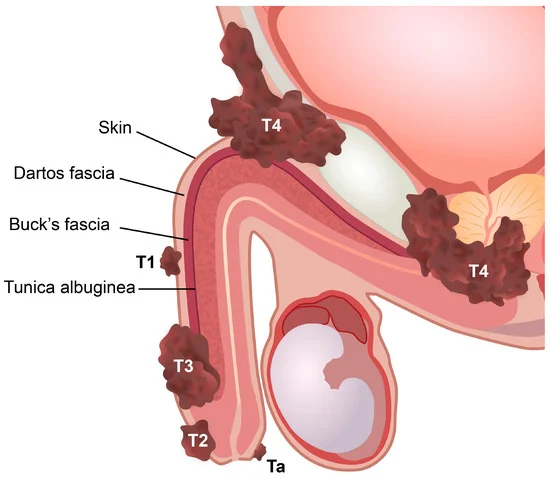Penile cancer can be treated effectively with various methods, depending on the stage, location of the tumor, and the patient’s overall health. Common treatment options include surgery, radiation therapy, laser therapy, and topical medications for early-stage cases. In more advanced stages, chemotherapy or a combination of treatments may be recommended. Choosing the right treatment plan requires a thorough diagnosis and consultation with a cancer specialist. Early detection plays a crucial role in successful outcomes and preserving quality of life. If you notice unusual symptoms, seek medical advice promptly to explore the best treatment options for penile cancer tailored to your needs.

1. Medication (Topical Treatment)
If the tumor is located on the surface of the skin, doctors may prescribe a medicated skin cream to treat the cancer directly.
2. External Beam Radiation Therapy
- Ideal for treating small, localized lesions.
- Involves directing radiation from a machine outside the body to the target and destroying cancer cells.
3. Cryosurgery (Cryotherapy)
- A technique that uses extreme cold to destroy cancer cells.
- Cold gases are passed through a metal probe inserted through a small cut to freeze and kill the tumor tissue.
4. Circumcision
- Recommended when the cancer is confined to the foreskin.
- Involves the surgical removal of the foreskin to eliminate cancerous tissue.
5. Penectomy
- Surgery to remove part or all of the penis, depending on the extent of the disease.
- It can be a partial or total penectomy, depending on how far the cancer has spread.
6. Lymph Node Dissection
This surgery removes lymph nodes in the groin and/or pelvic area to check or prevent the spread of cancer.
7. Radiation Therapy
Used to destroy cancer cells and prevent them from growing.
Types:
- External Radiation Therapy: Radiation is delivered from a machine outside the body.
- Internal Radiation Therapy (Brachytherapy): Radioactive implants or devices are placed inside the body near the tumor.
Possible Side Effects:
- Tiredness
- Skin irritation
- Stomach discomfort
- Loose stools
8. Chemotherapy
Chemotherapy uses drugs to kill cancer cells or prevent them from multiplying.
Types:
- Topical Chemotherapy: Applied directly through the urethra using a catheter. This treatment only targets surface tumors and is not effective for deeper or spread cancers.
- Systemic Chemotherapy: Drugs are given via IV or orally, allowing them to travel through the bloodstream and target cancer cells throughout the body.
After Chemotherapy – Common Side Effects:
- Fatigue
- Nausea or vomiting
- Mouth sores
- Loss of appetite
- Hair loss
- Increased infection risk
- Diarrhea
